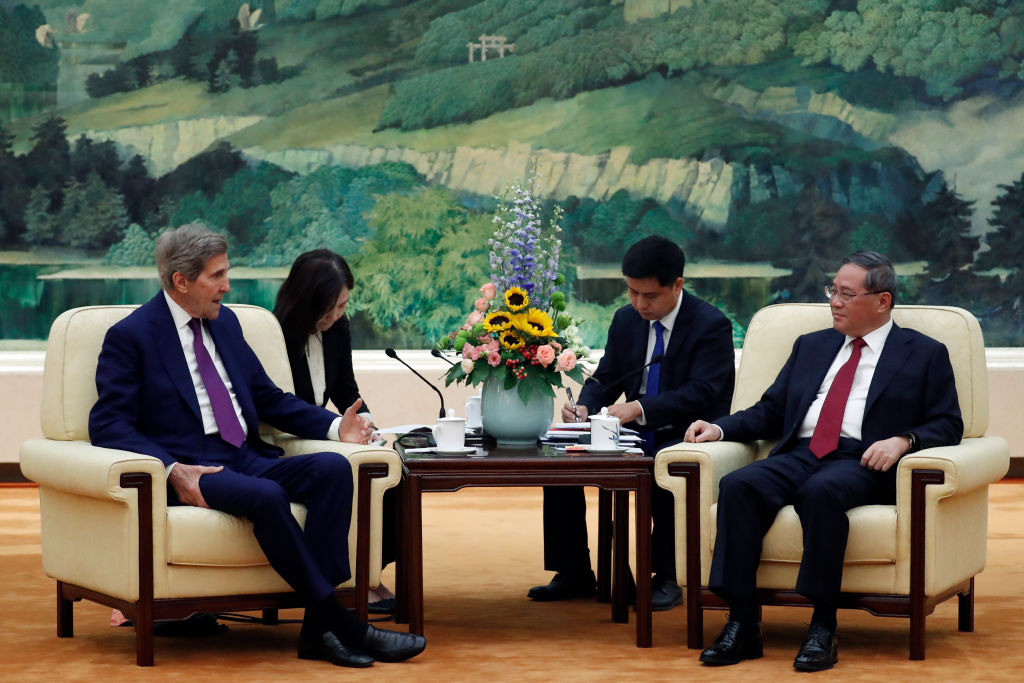
(To get this story in your inbox, subscribe to the TIME CO2 Leadership Report newsletter here.)
U.S. climate envoy John Kerry visited China this week to jumpstart climate discussions between the world’s two largest economies and greenhouse gas emitters amid a period of serious tension between the two countries.
To longtime followers of the ins and outs of climate policy, the trip was an important stop on the trudge to the United Nations climate conference to be held in Dubai this fall. But, still, it wasn’t exactly monumental. For years, China and the U.S. have wrangled over many of the same questions at hand this week with a series of breakthroughs and setbacks. “It’s going to take a little bit more work to break the new ground,” Kerry said upon the conclusion of his visit.
Despite this, the visit drew unprecedented interest—and not just from climate policy wonks but from policymakers and professionals in a range of fields. While the usual suspects wondered how the engagement might affect climate negotiations, many others wanted to know whether Kerry could facilitate a wider boost in relations between the two countries and how the visit would affect businesses reliant on Chinese exports of climate-related technology.
Welcome to a new era of climate geopolitics. As international climate politics and diplomacy have grown in importance, they’re now key to a wide swathe of political leaders, foreign policy wonks, and business executives—not just the small group of climate insiders who have followed these issues for decades. In a way, it’s an exciting opportunity for environmental policymakers to make climate a top-tier issue. But it also comes with the risk that climate gets consumed in the other geopolitical challenges of the day.
From the very first days when climate change entered common parlance, policymakers and political leaders have approached it as a geopolitical issue. Year after year, diplomats have gathered at U.N.-sponsored meetings to negotiate climate matters and, on occasion, brokered international agreements. Nonetheless, climate never occupied the geopolitical center stage. The global economy’s shift toward low-carbon energy and industry has changed that.
Take trade policy. Trade relations are both central to the international agenda of most governments and an easy avenue to incentivize other countries to decarbonize. And, yet, governments have remained reluctant to go there for decades, fearful of disrupting anything that might foster economic growth.
That thinking has evolved in the last few years. The European Union is implementing a fee on imports for high-carbon products. The U.S. Inflation Reduction Act incentivizes domestic production of clean energy technology in a way that touches directly on trade relations. And countries around the world are racing to shore up relationships that will allow them to buy and sell climate technologies. All of this has led to geopolitical tensions. And, unlike with past climate disputes, concerns have been leveled by presidents and prime ministers, not mid-level government officials.
But it’s not just trade policy. Just look at Kerry’s visit to China and the broader conversation around U.S.-China relations. The two countries are at odds over everything from Taiwan to TikTok. But discussions around climate—where both parties agree on the objective—provide an opening to keep a constructive relationship alive. “Our hope is that this can be the beginning of a new definition of cooperation and capacity to resolve differences between us,” Kerry told China’s top diplomat earlier this week.
The dawn of this new era in climate geopolitics is of note for businesses, too, and comes amid a broader reassessment of the importance of geopolitics for the bottomline. In the decades following the collapse of the Soviet Union, businesses and investors bet on increasingly free markets and liberalized trade as they built global supply chains with some degree of geopolitical stability assumed. Ultimately, efficiency trumped security.
A range of factors—most notably the Russian invasion of Ukraine but also rising populism and tensions with China—have led to a reassessment. And climate change is right in the middle of it. The largest companies are keenly watching the evolving geopolitics of climate. A January report from the International Energy Agency showed that China has at least 60% of the world’s manufacturing capacity for solar panels, components of wind energy systems, and batteries, leaving big companies in the west committed to decarbonizing vulnerable to any geopolitical friction that might halt exports of those goods. The E.U. is the world’s largest market for imports, and companies are also closely watching how geopolitical saber rattling related to climate policy might affect their ability to sell goods in the continent.
All of this means that climate has officially arrived as a top-tier geopolitical issue. That fact alone should bring relief to those who have watched the issue be ignored amid seemingly more urgent hot button topics over the last several decades. Still, with increased relevance, there’s a new risk running in the opposite direction: that climate will no longer be an area where countries cooperate in spite of other challenges.
More Must-Reads From TIME
- The 100 Most Influential People of 2024
- Coco Gauff Is Playing for Herself Now
- Scenes From Pro-Palestinian Encampments Across U.S. Universities
- 6 Compliments That Land Every Time
- If You're Dating Right Now , You're Brave: Column
- The AI That Could Heal a Divided Internet
- Fallout Is a Brilliant Model for the Future of Video Game Adaptations
- Want Weekly Recs on What to Watch, Read, and More? Sign Up for Worth Your Time
Write to Justin Worland at justin.worland@time.com